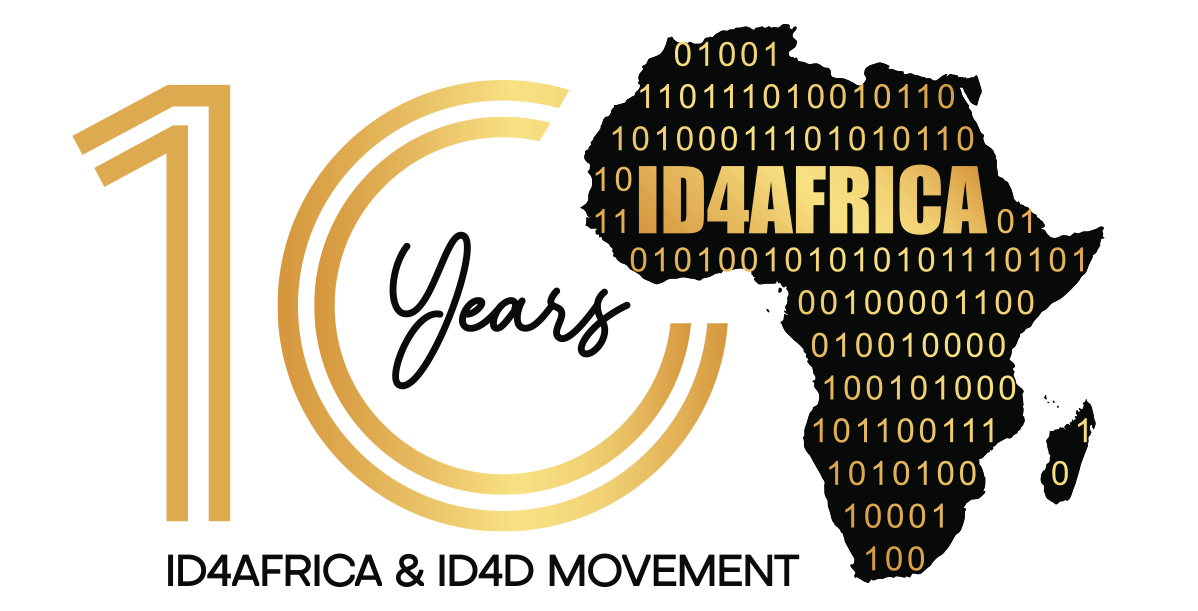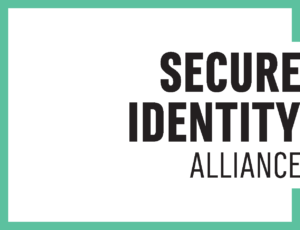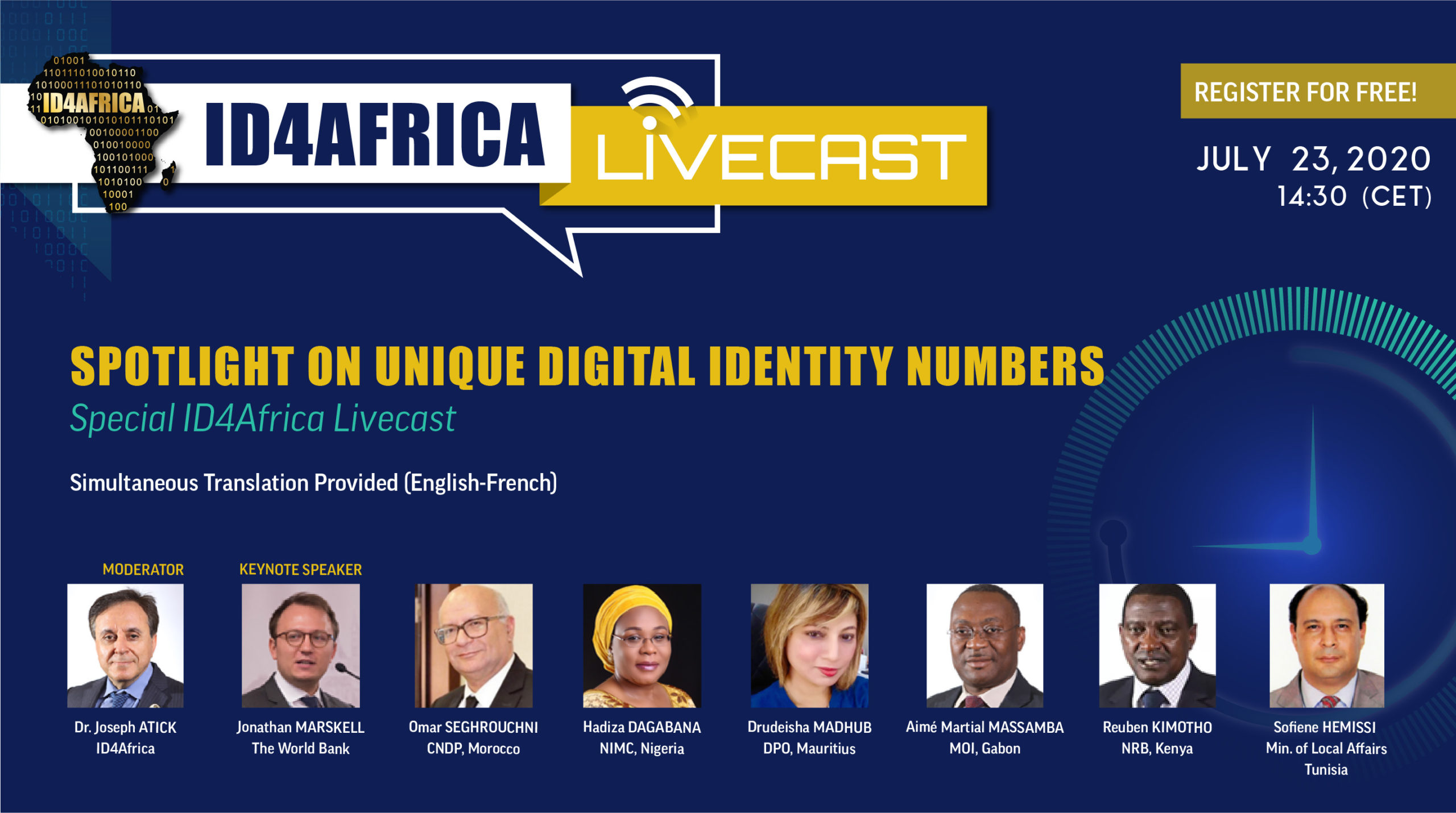
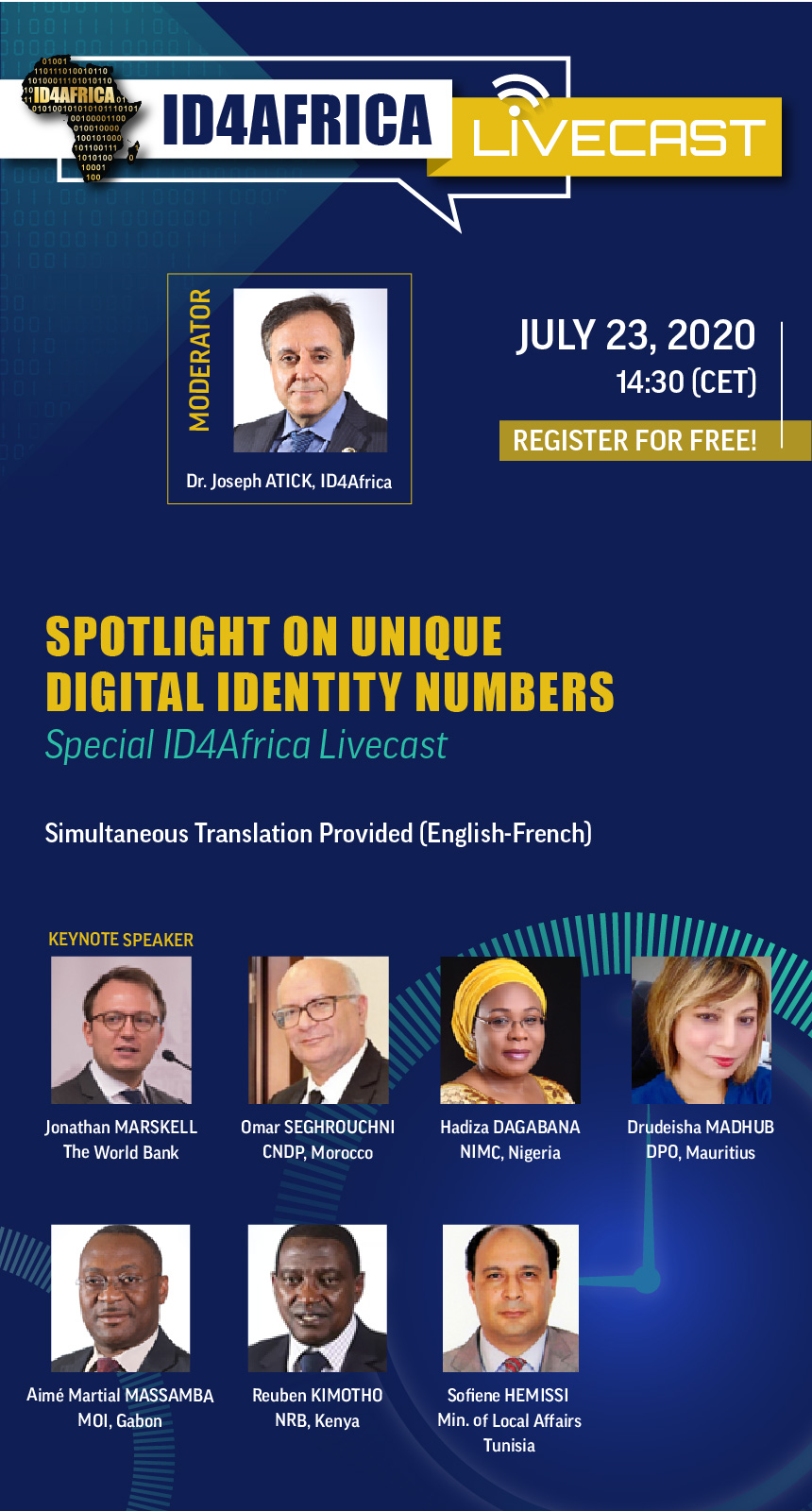
Unique digital identity numbers to identity populations are not new. Many African countries have attributed them as part of their next generation national identity programs. But the topic has been catapulted to the forefront of the discussion by the recent rush to establish digital identities in order to deliver services remotely in response to the COVID pandemic. Government agencies need to identity and target their citizens in order to deliver assistance and to grant services linked to a number. This form of digital identity raises its own set of issues and concerns that need to be understood in the short term and addressed over time.
In response to this need which was identified over a year ago and which has inspired our thematic for 2020 Annual General Meeting (Digital multiplicities of unique identity), ID4Africa is organizing a spotlight session dedicated to the question of the unique identity numbers. It features a lineup of experts that will present the various points of view. The objective is not to promote any particular approach, but to make our community aware of the various approaches that have been established and the experience with those.
Among the questions that the panel will address are:
- Should there be one unique identity number that is used by all agencies (sectors) to identify individuals?
- Alternatively should different sectors be allowed to produce their own identifiers (linked or not to a foundational number which is never used for service but attests for the uniqueness and existence)?
- What are the privacy and data protection implications of each model?
- What are the challenges and complexities of implementation of each model?
- How can the benefits of uniqueness be realized in the second model?
- What active privacy measures can be implemented to avoid the emergence of profiling or surveillance of the population as a result of consolidating identity-enabled use data? Does tokenization have a role to play?
- What has the experience in Africa been in this regard? What are the African identity authorities planning to do relative to their unique identity numbers? What about the rest of the world?
And much more!
The Moderator

Dr. Joseph Atick
Executive Chairman
ID4Africa
Dr. Joseph Atick is a recognized world renowned advocate and expert on identity matters. Having been one of the founders of the identity industry nearly 30 years ago, he led several companies in that domain and developed some of the foundational algorithms underlying secure digital identity today, including the first commercially viable face recognition algorithm. He retired from the industry in 2010 to focus on promoting identity for social and economic development around the world. In that mission he partnered with the World Bank and other UN agencies, and was heavily involved in the development and field testing of the methodology and analytic tools that would guide the subsequent activities in that space, and would lead to the launch of the ID4D initiative at the World Bank. In 2014, he co-founded ID4Africa as a pan-African Movement to promote responsible digital transformations through digital identity in Africa. He is a staunch defender of privacy, data protection and human rights and continues to provide counsel to governments and international organization on the use of identity for public good. Dr. Atick holds a Ph.D. in Mathematical Physics from Stanford University.
Keynote Speaker

Jonathan Marskell
Jonathan is a Senior Program Officer for the World Bank Group’s global Identification for Development (ID4D) initiative. As a specialist in digital ID and civil registration, he has been involved in financing and technical assistance projects in countries across Africa, South Asia, East Asia and the Pacific, as well as leading or contributing to the development of ID4D’s knowledge products. Before joining the World Bank Group in 2016, he worked as a consultant on ID and civil registration and vital statistics for organizations such as ESCAP, UNHCR and UNICEF.
The Panelists
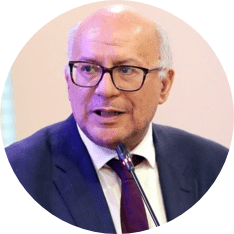
Omar Seghrouchni
President
CNDP, Morocco
Read Bio
Omar Seghrouchni started his career in 1988, in France, in the world of research (focusing on real time and embedded systems), before joining consulting structures in organization and information systems, then creating his own cabinet.
He has piloted several major transformation projects in both the private and public sectors, in France and Morocco, and more broadly in Europe. He accompanied the various waves of urban planning and business architecture. He developed the concept of “governance of transformations”.
Since 2010, he has been a member of the CNDP (National Commission for the Control of the Protection of Personal Data). On November 17, 2018, he was appointed by His Majesty the King as Chairman/President of the same Commission.
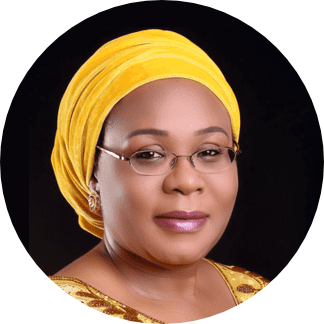
Hadiza Ali Dagabana
General Manager National Identity Management Commission (NIMC)
Read Bio
Hadiza joined NIMC in 2008 to establish the Regulatory and Compliance Department. She is currently General Manager for Legal, Regulatory & Compliances Services, and is Secretary to the Commission. Hadiza has over 26 years’ experience in corporate legal practice and is an active Member of the ID4Africa Movement; Secure Identity Alliance; Nigerian Bar Association; Federation of Women Lawyers and the International Bar Association. She has served extensively in legal capacity for the Nigerian government, holding roles such as Senior Counsel at the Bureau of Public Enterprises and Legal Advisor at Transcorp. Hadiza is widely accomplished academically; holding degrees and certification from a number of international and regional institutions.

Drudeisha Madhub
Data Protection Commissioner, Data Protection Office (DPO), Mauritius
Read Bio
Drudeisha has been Commissioner for Data Protection at the DPO Office since August 2007. She has a background in professional law which she practiced for 6.5 years at the Attorney General’s Office, prior to becoming Commissioner. She is a Member of various international networks such as the AFAPDP, RAAPDP, the Council of Europe, among others. In 2011, Drudeisha was appointed data protection and human rights expert by Interpol and has been a member of the Commission for the Control of Interpol Files. She is currently a member of the UN Global Pulse Data Advisory Group
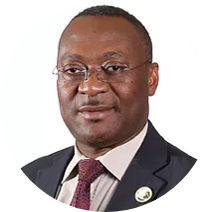
Aimé Martial Massamba
Deputy Director, The Official Biometric Identification Project of Gabon (IBOGA) Ministry of Interior, Gabon
Read Bio
Aimé Martial started his career in 1995 as a development engineer at the General Directorate of Information Technology of the Ministry of Finance. He worked there as Deputy Project Manager responsible for the development of state-of-the-art microcomputer applications (Computerization of Baccalaureate exams, Management of Equipment for Military Health Services, Management of Decorations, File of Social Aid, Management of the Regulations Law etc.), to the CANADI Project (National Identity Card) within the National Police Force.
Passionate about software development, he was in charge of event programming at the Institut Supérieur de Technologie in Libreville from 2001 to 2005. He was then assigned to the General Directorate of Stock Exchanges and Internships to rewrite the State Scholarship Management system until his return to the National Agency for Infrastructures and Digital Frequencies (ANINF) in 2012. He was promoted to be responsible for the technology pool to support the contracting authority in the implementation of the IBOGA Project and the National Certification Authority of Gabon. In 2013, he was promoted to Deputy Director of the IBOGA Project at the Ministry of the Interior and Head of PKI Department at ANINF. In April 2020, he was promoted to Advisor on IT Issues and the National Identity Card (CNI) at the Directorate General for Documentation and Immigration to whom the Government has just entrusted the task of implementing the CNI.

Reuben Kimotho
DIRECTOR FOR NATIONAL REGISTRATION,
NATIONAL REGISTRATION BUREAU (NRB), KENYA
Read Bio
Reuben is the Director of National Registration at the NRB in Kenya. He holds a Masters in Public Administration and a Bachelors degree in Law. He is also an advocate of the High Court of Kenya. Mr. KIMOTHO has wide experience in public administration, and citizens’ registration (including Registration of births and deaths).
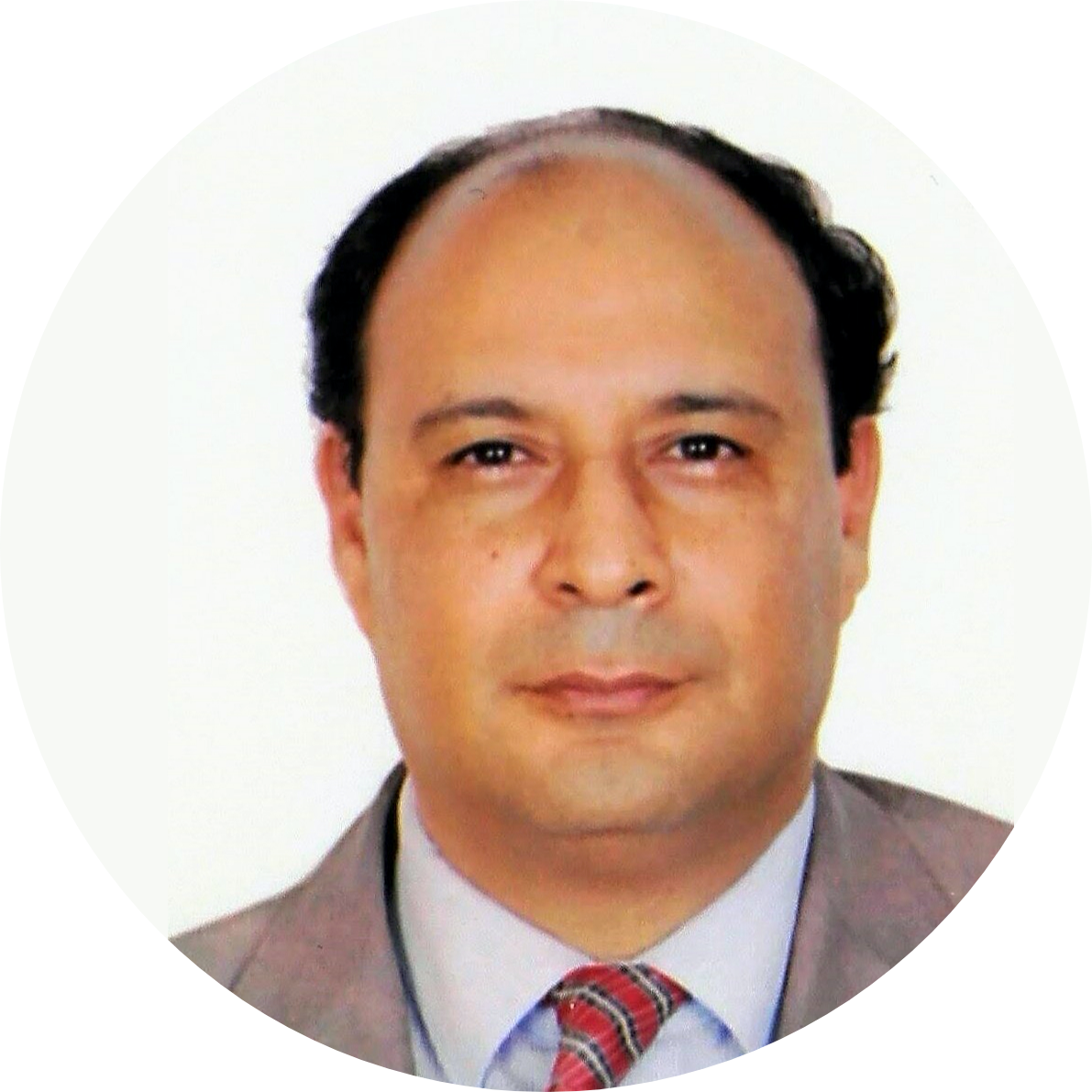
Sofiene Hemissi
Director General, Informations System Department Ministry of Local Affairs and Environment
Read Bio
Sofiene is currently the Director General of Information Systems Development at the Ministry of Local Affairs and Environment, Tunisia. In this capacity he oversees the Nation Unique Citizen Identifier project and the overhaul of the National System of Civil Status. In the past he has held several positions including CEO of the National Computer Center (www.cni.tn); Director General of Information Technologies at the Ministry of Digital Economy; National Coordinator of the eGov program of the National Strategic Plan for the Digital Economy – “Digital Tunisia 2020” during 2015-2016. Mr Hemessi is an Expert in public procurement in the digital domain.
